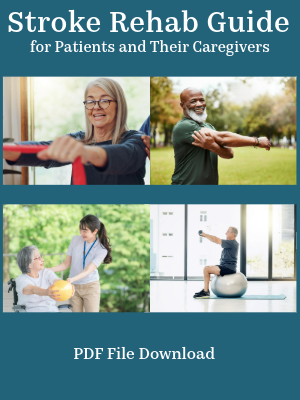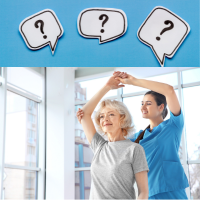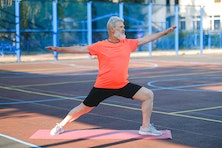Submissions from Readers
Sleep Deficiency
Please help me in my endeavor to help my brother who suffered a massive stroke five years ago. He immediately received therapy and was doing great. He could talk although his speech remained a little distorted. He could walk but with a slight drag of the right leg. He even began to drive. However, he has recently began to fall into a depression that has affected him intensely and he has lost all interest in any activity, being around others, has become weak and is suffering anxiety attacks, does not have an appetite and has lost his sleep completely.
Could you please enlighten me as to what we can give him to help him sleep? He was on Ambien for sleep and they took him off of it because the long term use of this med began to attack his sense of taste and his ability to swallow including episodes of nausea. Please help me or inform me of what I can do for him.
Answer: The National Sleep Foundation has some information on their website concerning sleep health that might be helpful at https://www.thensf.org/sleep-health-topics/. You might consider evaluation by a sleep clinic which could help identify the specific reason your brother is not sleeping. If you do a search on the web for sleep disorders after a stroke, you can gain a wealth of information.
You also mentioned depression which is common after stroke. In order to determine if your brother is experiencing clinical depression or other similar problems, have an evaluation performed by a physician. I would look specifically for a neuropsychiatrist who will have experience in dealing with post stroke depression and anxiety. The neuropsychiatrist may be able to help with the sleep disturbance as well.
Comments for Sleep Deficiency
|
||
|
||
Sleep Problem
Question:My father had a stroke eleven weeks ago. It was a block (ischemic) stroke, and he cannot balance very well. He has lost the use of his left side and is unable to walk. He hasn't slept for longer than three hours at a time ever since. Any sleeping tablet me has taken seems to have a bad effect. He becomes hyperactive and behaves in a very strange manner (plucking things out the air saying, they need to be picked) and constantly trying to get out of bed. My mum is his main caregiver. She is 78 years old and suffering badly with lack of sleep. All the care he needs during the day is manageable by my mother and sister, but mum needs a night's sleep! What could help my Dad sleep? Nytol, rescue remedy, diazepam, Phenergan, etc. just don't work. Any advice would be really appreciated.
Answer: I recommend reading https://www.stroke.org/en/about-stroke/effects-of-stroke/physical-effects-of-stroke/physical-impact/sleep. Sometimes sleep-disordered breathing can occur after stroke including obstructive sleep apnea (OSA) or central sleep apnea (CSA) or both. OSA is more common than CSA after stroke, 30% to 70% versus 6% to 24%, respectively. CSA may be associated with underlying heart disease in a subset of patients with stroke, particularly medullary or bilateral hemispheric stroke. CSA may improve or resolve within a few months poststroke, whereas OSA is an independent risk factor for stroke but may also develop or continue as a result of the stroke. To determine if your father may have one of these conditions, I recommend talking to a sleep specialist or having a sleep study done to determine what is wrong and if anything can be done to help. Ask about trying a portable sleep monitor that can be used at home to determine sleep issues.
As a temporary fix for your mom not getting sleep, I would recommend she try to take a nap during the day when your sister is present and able to assist with your dad.
Comments for Sleep Problem
|
||
|
||
|
||
|
||
|
||
|
||
Sleep Disorder
by Rose
Question: My mother had a second stroke. She is 77 years old. She is having trouble sleeping at night and yelling and talking constantly. Doctor gave her 25 mg. Atarax to sleep. She also having trouble eating. She doesn't want to eat. She drinks some water that's all. She is also having trouble taking medicines. She refuses to take them.
Answer: It sounds as if your mother has had some cognitive changes due to her stroke. If the second stroke is recent, it may be that you just need to give her a little time to recover. If it has been over a couple of months since this second stroke and these behaviors have remained consistent, then you may want to consider some type of schedule. I would make sure she is getting plenty of activity during the day and not sleeping too much so that she can sleep better at night. You can try making the bedtime routine relaxing. Some examples may include a warm shower, music, and lightly massaging lotion on to her skin. I would make sure she goes to bed at the same time each night. If she sleeps any during the day, keep that time consistent as well. I would also try to schedule feeding at the same times each day, and make sure you include some of her favorite foods at each meal. If she won't each much, you can try supplementing with drinks or puddings such as Ensure (or whatever her physician recommends).
For the medication issue, check with her physician and see if it's okay to crush her medicines and put them in something more tasty like ice cream or pudding. I would also check with the physician and see which medicines are mandatory or the most important to make sure you try to get those down first. If the stroke has affected her cognition and reasoning abilities, you may not be able to convince her to take food and medicines. If this is the case, then I would make sure she has some cognitive retraining with a speech therapist. Let the therapist know the areas in which your mom is having trouble so goals can be set accordingly.
Comments for Sleep Disorder
|
||
|
||
|
||
Sleep
by Malachy Ó Casaide
(Cork, Ireland)
Question: What would cause a resident to sleep on and off at night and to be getting agitated after a stroke?
Answer Sleeping difficulty and agitation are not uncommmon after stroke and can be a direct result of the stroke. The patient's MD may be able to give medications that can help with sleep and agitation so I recommend consulting with the physician. If the stroke was recent, the patient may just need time to heal and stabilize into a more regular sleep pattern which in turn may also help with agitation.
Sleep
Question: I had a stroke 10 months ago but find I still sleep a lot. My right side leg,arm and speech was affected but have all come back. I sleep in the evenings but wake up at 4:00 in the morning. I work full time from 7:30 am to 5:00 pm but start getting sleepy at about 2:00 and then go right to sleep at home around 6:00
Answer: It is not uncommon to want to sleep more or become more fatigued at the end of the day after stroke. I would definitely mention the fatigue to your MD. Some things to consider that might be causing fatigue would be medicines that you are taking, the total amount of sleep you are getting (or not getting), any issues with blood work (e.g. anemia), and your diet. If you can't contribute fatigue to any other factors, then it is probably just a side effect from your stroke. If approved by your MD, it would be good to do some type of cardiovascular exercise which in turn may improve your endurance. Since you work, you don't have the luxury of taking a short afternoon nap, but I do often tell patients that experience sleepiness/fatigue to take a nap in the afternoon if needed.
How does a CPAP machine help?
by Akida
(East Africa)
Question: How does a CPAP machine help?
Answer: CPAP stands for continuous positive airway pressure, and a CPAP machine is used to help a person who has obstructive sleep apnea (OSA). Obstructive sleep apnea is a serious condition that causes people to stop breathing when they are sleeping. A person with OSA is two to four times more likely to have stroke. Sleep apnea is often managed with the use of a CPAP machine. By controlling sleep apnea, one can help reduce their risk of stroke.
Sleeping
by Colin Turner
(Australia)
Question: I had a stroke two years ago, after my doctor had taken me of Warfarin for A/F. I have been unable to get sleep, as I used to be able to sleep at any time of the day or night.I have also lost my taste, and I throw most of my food in the bin. I have stopped drinking/ smoking and also stopped taking sugar. I am now back on Warfarin, have tried different kinds of sleeping tablet, but they do no good.
Answer: You have already done some good things to try and help ward off the insomnia such as cutting out smoking, drinking, and excess sugar. Here are some other tips that might help with insomnia:
1) Try to go to sleep and get up at the same time each day
2) Don't exercise or eat large meals within 2 hours of going to bed
3) Make sure the room is quiet and that the temperature is comfortable
4) Don't take naps late in the afternoon (take them earlier in the day)
5) Do something relaxing the 30 minutes before going to bed that does not involve the TV or computer (e.g. listening to music, bath, or reading)
6) Talk to your physician about any medications that may be causing insomnia
7) If nothing seems to work, you could consider consulting with a sleep specialist and have a sleep study done. Sometimes things like restless leg syndrome or sleep apnea can cause problems, and these issues can be identified with a sleep study.
Comments for Sleeping
|
||
|
||
Stroke patient not opening eyes and rehab
Question: Hi. I've been searching and searching to find information on what could be causing a stroke patient to keep their eyes closed. I had two aunts (both in their 80s) that each had severe strokes recently (within the past week and a half). The aunt that's keeping her eyes closed, initially seemed very responsive. Her eyes were opened, she would look around. Now for the past 3 days she doesn't open her eyes. What could be the cause of this? She does open them when you ask her too, but on her own she doesn't. She still responds a little to music (by moving her head up and down and seems like she's tapping the foot that's not paralyzed), she knows who we (the family) are and she squeezes your hand, but we're concerned that she's keeping her eyes closed. Can you please give us some insight as to what could be going on? Her doctor will be having her reevaluated. We would like for her to be in the same ward as her sister because we think it will be very helpful in their recovery to be able to be together and see each other. We've requested that from one of the doctors, and have to talk to the other doctor now. Please HELP! We're so worried and saddened by this and want the absolute best care for the best outcome for both of them .
Thank you so much,
Sheena
Answer: Early on after a stroke, it is not unusual to be sleepy or difficult to arouse or to keep the eyes closed. She may just need a little more time than her sister to recover her level of alertness. On the other hand, if you feel she was alert and has declined significantly, I would check to see if medications are causing the problem or dehydration. Many medicines can cause drowsiness. I have also seen stroke patients become dehydrated and lose their alertness. If dehydration is an issue, then a hydration IV will help. These are things to ask your medical provider to evaluate.
sleepiness
by Eileen
(Pequannock, NJ)
Question:My husband had a mini stroke about 7 months ago. Now he seems to be worse with sleeping about 20 out of 24 hours a day. Is this normal and what can I do to help him stay awake? He also has very severe twitches when holding the TV remote, a spoon, a cup and various other items.
Answer: The effects of the TIA should only be temporary so this problem that he is having now 7 months later should not be related unless he is possibly having more TIAs. He needs to see a neurologist or MD to find out what is going on.
Lethargic, tired, drowsy.
by Silvana
(Long Beach, CA)
Question: I had a minor stroke 3 months ago. It affected my speech. I recuperated most of it. I still feel lethargic, tired, drowsy some days more and some days less with very slow improvement overall. Is this permanent?
Answer: Only time will tell if the lethargy and tiredness will stay with you. It is not uncommon to experience this within the first six months to a year after a stroke so hopefully your symptoms will improve with time. If the symptoms do not improve, speak with your MD about some possible solutions (e.g. nutrition counseling, meds, exercise, etc.).
My dad had a stroke, doesn’t sleep and has anxiety at night only?
by Angie
(Hacienda Heights ca)
Question My dad is 78 and had a stroke but lately he doesn’t sleep all night and gets anxiety. Also it’s only at night. What could we do? He gets panic attack too like he can’t breathe.
Answer: Several things come to mind. If the muscles are tight between the ribs or have spasticity, this could be an issue. You could ask for therapy orders to address ribcage tightness or postural issues that may be affecting breathing. It's possible that he might have a breathing disorder during sleeping or when in supine. This could be addressed by a sleep disorder specialist to make sure he doesn't have sleep apnea or decreased oxygen levels when lying down. Sleep disorders and breathing issues during sleep are common among stroke patients. It's possible that he just has anxiety and might benefit from medication. I would encourage you to take him do a doctor to explore the exact cause of the problem, and in my opinion, it would be best to see a sleep specialist.
Comments for My dad had a stroke, doesn’t sleep and has anxiety at night only?
|
||
|
||
Treatment Tips from Others
To see tips from other survivors and caregivers about their treatment recommendations, click here.
Get Our Stroke Rehab Guide

Our stroke rehab guide is designed specifically for patients and caregivers. It's in pdf format and can be immediately downloaded. It includes about
- Stroke Definition & Causes
- Stroke Treatment
- Rehabilitation Information for Physical, Occupational and Speech Therapy
- Exercise pictures
- Q&A from patients and caregivers
- Adaptive Equipment & Techniques
- How to Prevent Another Stroke & More!
Medical Disclaimer: All information on this website is for informational purposes only. This website does not provide medical advice or treatment. Always seek the advice of your physician or other healthcare provider before undertaking a new healthcare or exercise regimen. Never disregard professional medical advice or delay seeking medical treatment because of something you have read on this website. See the disclaimer page for full information.
- Home
- Stroke Questions
- My dad had a stroke, doesn’t sleep and has anxiety at night only?













